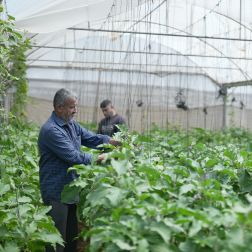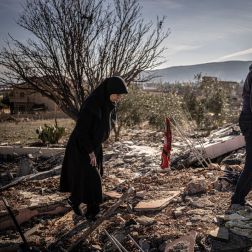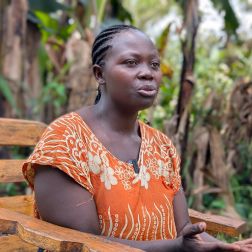- 5 mins read time
- Published: 13th April 2021
People's Vaccine Alliance survey shows urgency of vaccinating all countries

An epidemiologist is an expert in the branch of medicine which deals with the incidence, distribution, and possible control of diseases. In “normal” times, you don’t hear much about them, and they rarely make the news.
But these aren’t exactly normal times, are they?
Epidemiologists from some of the world’s leading academic institutions have recently made the headlines, delivering a stark warning about the risk the world is taking by failing to ensure all countries have sufficient vaccines to protect people from Covid-19.
The People’s Vaccine Alliance, a coalition of over 50 organisations including Oxfam, African Alliance and UNAIDS, surveyed 77 epidemiologists from 28 countries in March. The overwhelming majority – 88 percent – agreed that persistent low Covid-19 vaccine coverage in many countries would increase the risk of vaccine-resistant mutations.
Two-thirds of those surveyed think we have a year or less before Covid-19 mutates to the extent that the majority of first-generation vaccines are rendered ineffective, and new or modified vaccines will be required.
And almost three-quarters of epidemiologists, virologists and infectious disease specialists from institutions including Johns Hopkins, Yale, Imperial College, Columbia University, Cambridge University, the University of Edinburgh and the University of Cape Town said that open sharing of technology and intellectual property could increase global vaccine supplies.
The findings support and show once again the urgency of the People's Vaccine Alliance call to lift pharmaceutical monopolies to allow for the sharing of Covid technology to urgently boost vaccine supplies globally.

So what are the experts saying?
The more the virus circulates, the more likely it is that mutations and variants will emerge, which could make our current vaccines ineffective. At the same time, poor countries are being left behind without vaccines and basic medical supplies like oxygen. As we've learned, viruses don't care about borders. We have to vaccinate as many people as possible, everywhere in the world, as quickly as possible. Why wait and watch instead of getting ahead of this?— Devi Sridhar, Professor of Global Public Health at the University of Edinburgh
With millions of people around the world infected with this virus, new mutations arise every day. Sometimes they find a niche that makes them more fit than their predecessors. These lucky variants could transmit more efficiently and potentially evade immune responses to previous strains. Unless we vaccinate the world, we leave the playing field open to more and more mutations, which could churn out variants that could evade our current vaccines and require booster shots to deal with them. We all have a self-interest in ensuring that everyone around the world, no matter where they live have access to Covid-19 vaccines. The virus doesn’t respect borders and new variants somewhere on the planet mean none of us are safe.— Gregg Gonsalves, Associate Professor of Epidemiology at Yale University
As nations start to expand their vaccination programmes we are once again reminded about our interdependence. High coverage rates and herd immunity in one country or region of the world while others, particularly low- and middle-income countries, continue to wait in line will create the perfect environment for the virus to continue to mutate and negate the benefits of any vaccine protection. In contrast, there are enormous benefits for everyone to have more equitable access to available doses of vaccines and achieve herd immunity globally sooner. As scientists, advocates, and decision-makers we must ensure that as many people are vaccinated all over the world and as soon as possible so that we can all focus our efforts in rebuilding our communities, livelihoods, and economies and know that we are all safe from Covid-19 and be better prepared for the next pandemic.— Quarraisha Abdool Karim, Associate Scientific Director of CAPRISA and Professor in Clinical Epidemiology at Columbia University

The survey shows that it is imperative for the safety of all citizens in all countries that people everywhere are vaccinated as soon as possible; our failure to tackle global vaccine inequality heightens the risk of further mutations.
Despite this imperative, wealthy countries’ continued defence of the monopolies of pharmaceutical giants means that global supplies are being artificially rationed, with a handful of companies deciding who lives and who dies.
In March, wealthy countries – including Ireland – blocked a proposal to waive intellectual property rights for Covid-19 vaccines. The People’s Vaccine Alliance urges them to reconsider when talks resume at the World Trade Organisation this month.
The Alliance is also calling for all pharmaceutical corporations working on Covid-19 vaccines to openly share their technology and intellectual property through the World Health Organisation Covid-19 Technology Access Pool, in order to speed up and ramp up the production and rollout of vaccines to all countries.
If we were in a war with a country called Covid, would governments leave vital decisions on production, supply and price in the hands of arms-producing companies? Given vaccines are our most crucial weapon in the fight against Covid-19, world leaders must take control to enable the World Health Organisation’s Covid Technology Access Pool to facilitate sharing of technology and intellectual property so that all capable companies can maximise global vaccine production.— Dr Mohga Kamal Yanni, Senior Health Policy Advisor to The People’s Vaccine Alliance
The survey was carried out between 17 February and 25 March 2021.
The respondents were from the following 28 countries: Algeria, Argentina, Australia, Belgium, Bolivia, Canada, Denmark, Ethiopia, France, Guatemala, India, Italy, Kenya, Lebanon, Norway, Philippines, Senegal, Somalia, South Africa, South Sudan, Spain, UAE, Uganda, UK, USA, Vietnam, Zambia and Zimbabwe.




